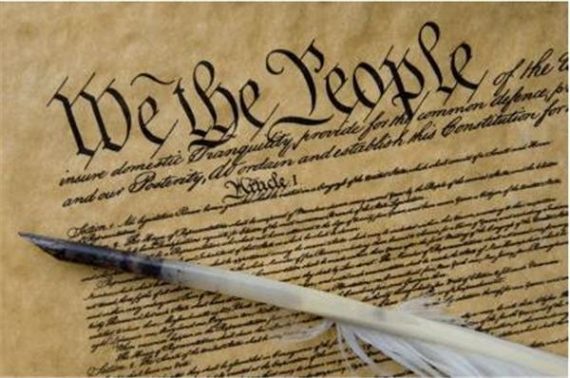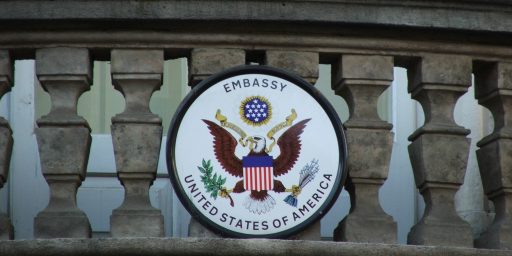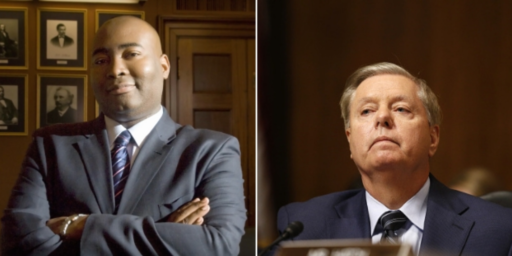Can Congress Extend Director Mueller’s Term at the FBI?
Would it be unconstitutional for Congress to extend Mueller's term?
 Jonathan H. Adler asks over at the Volokh Conspiracy: May Congress Extend the FBI Director’s Term?
Jonathan H. Adler asks over at the Volokh Conspiracy: May Congress Extend the FBI Director’s Term?
The question arises because President Obama has requested a two year extension for Mueller’s term (see here for details).
Adler writes:
On Wednesday, the Senate Judiciary Committee held a hearing on the President’s request, at which two prominent constitutional law professors considered whether such an extension would be constitutional. William & Mary’s William Van Alsytne testified that extending the FBI director’s term through legislation would be “wholly constitutional.” The University of Virginia’s John Harrison, on the other hand, suggested that extending the Director’s term would raise serious constitutional concerns under the Appointments Clause. According to Harrison, such legislation “would be inconsistent with the Constitution because it would seek to exercise through legislation the power to appoint an officer of the United States, a power that may be exercised only by the President, a head of department, or a court of law.” Should the President and Congress wish to keep Mueller in his position, Harrison suggested, other means would be required for it to be constitutional.
Adler leaves the question open, as he does not answer the question in his post title.
Now, I must confess that when I heard that the President was seeking an extension of Mueller’s term, it struck me as a bit odd. First, I am not a big fan of the notion that anyone is the indispensible man (or woman). If we can change SecDef, CIA Director, SecState, or, for that matter, POTUS with more frequency than once a decade, surely we can find someone qualified for to replace the current FBI Director.
It is also a politically odd move for Obama: to request a two-year extension is to put the replacement after the termination of his current term in office. In other words, Obama currently has the power to appoint a Director for a ten year term but in asking for an extension he is running the risk of not having a long-term impact on the position, as there is the real chance of losing the election in 2012. Usually politicians prefer the bird in the hand, as opposed to that which remains in the bush.
Since the Constitution is silent on the FBI Director’s position (and, indeed, on the FBI itself) and because said institution, as well as the process by which the job of Director is to be filled, is wholly a creation of the legislature, it strikes me as odd to assume that the legislature would lack to power to make alternations, either permanent or temporary, to what it, itself, had created (and created with full constitutional authority). Indeed, the ten-year term and the entire process of nomination and confirmation is a creation of statute, not the constitution.
Indeed, the process dates to a 1968 law (with amendment, including the 10-year limit in 1976) that came about in response to the lengthy (to put it mildly) tenure in office of J. Edgar Hoover (who held the post for 48 years). Again: if the process is the result of legislation (which it is) than the Congress can change it at will (and without running afoul of any constitutionality questions).
The reference to the constitutionality of the move as it relates to the Appointments Clause strikes me a non-starter because, again, a process created by legislation can be changed by legislation. And, indeed, it was Congress’ choice to associate the FBI Director’s position with that procedure. Not all jobs in Washington use that process for appointment.
The only issues I can see is the notion that since Mueller’s original appointment was conferred, under the law, by a process of Senate confirmation (and therefore linked to the procedure in the Appointments Clause) that the full Congress cannot now extend the term without altering the law. However, this strikes me as an issue of figuring out the proper procedure rather than one of constitutionality. For example, why couldn’t the whole Congress vote for an extension package and then the Senate vote for the extension? Or, for that matter, why can’t the legislation be altered in any number of ways?
Further, it is the President who is making the request, and not the legislature acting on its own, so the spirit of the Appointments Clause strikes me as intact here.
Still, the salient point is that the issue at hand is really more one of statute than of the text of the Constitution.
And for those unfamiliar, here’s clause in question (Article 2, Section 2):
He shall have Power, by and with the Advice and Consent of the Senate, to make Treaties, provided two thirds of the Senators present concur; and he shall nominate, and by and with the Advice and Consent of the Senate, shall appoint Ambassadors, other public Ministers and Consuls…
h/t: Chris Lawrence’s FB feed.






I assume the issue is that the extension would be person specific (it would apply in name only to Mueller). As Harrison suggests, there could be a work around, but it would ultimately have to leave at risk the possibility that Obama would fill the position with someone other than Mueller.
Additionally to the arguments made in the post, the Senate alone has confirmation power and it’s a straight majority vote. So, if the House and Senate pass this legislation, wouldn’t it amount to a Senate confirmation of Mueller? The notion that Congress can’t do this, with the president’s blessing (via signature in making the bill law) is a head-scratcher.
The bill is here. It doesn’t identify Mueller by name, but it does extend the term of “the incumbent in the office of the Director of the Federal Bureau of Investigation on the date of enactment,” i.e. Mueller and only Mueller.
If Congress could do this, what’s to keep it from creating an office of global warming with a term of five years, unless filled by the Person holding the Office of the Vice Presidency on January 20, 1995? That would be tantamount to abusing Congressional authority to create offices, duties and terms in order to direct the executive’s right to appoint the officer.
Yes, I am a little dubious of this. Suppose a Congress were to pass a law like this, or one like in PD Shaw’s example, against a President’s wishes, and were able to override his veto. You would end up with Congress making an appointment, or extending an appointment, rather than the President doing so. No?
@PD Shaw and @Tano: I don’t know where in the Constitution it says the president has the right to appoint the FBI Director. Surely, Congress has the right to decide that the position be filled from the ranks of the civil service through ordinary processes rather than via presidential appointment, since it’s not a constitutional office?
James, I think Congress can change all kinds of things about the office of the FBI Director; it could make it’s term indefinite or subject to conditional extenstions; it could make the Director an inferior office subject to appointment by the President alone or the Attorney General.
I think the problem exists where Congress is making the terms of the office “personality – specific,” as it is doing here. At that point, I think Congress is exercising the executive’s power to nominate and to appoint. (Article II, Section 2, paragraph 2) I think that’s a problem even if the Director is relegated to an inferior officer position.
A practical consequence is Congress will get lazy defining and overseeing offices as long as it feels like it can control who holds office. We already vest a lot of discretionary authority in these offices, and Congress needs to act like the office might be held by someone whose discretion they may not enjoy.
But a key element in this case is that the move is being done at the request of the president, not via unilateral action by the Congress, so a lot of the scenarios above don’t really fit the discussion/action in question here.
I’m no Constitutional lawyer, so this is just me reading the text….
From this it seems that the President’s power to nominate “Officers of the United States” does not exclude offices “which shall be established by Law”. It does seem that the Congress has the power to write laws vesting the appointment power in others, but not itself….
Well, that true “in this case”. But what safeguards are in place to insure that in the next instance it cannot be done over the objections of the President?
Well, first veto and then, if overridden, court challenge. Such is the nature of separation of powers and checks and balances.
And, as with all unlikely and difficult abuses of power, the fact that they are both unlikely and difficult–not to mention basic politics. To wit: if there was enough political will in the Congress that a veto could be overridden, then that would likely mean sufficient public support for whatever it was that Congress was going to do that the President would likely be in favor of it, too.
Consider, too, that the scenario being discussed requires some issue that 2/3rds of both chambers of Congress want. How often does that happen?
Congress. Is there anything it can’t do?
That’s a serious question.
@Charles:
A simple answer to a complex question:
1. There are some things that they clearly cannot do (see Article 1, section 9). There isn’t much room for debate, for example, on the prohibition on titles of nobility.
2. There are some things that they cannot do, but subject to interpretation (i.e., Congress shall make no law…abridging freedom of speech, which is true, but there are also categories that have been carved out that they can abridge, like commercial speech).
3. And there are those limitations that are defined as much by the constitutional order as they are by political reality (e.g., Congress can only impeach a president for committing bribery, treason or other high crimes and misdemeanors, but it is a political question, in many ways, what “high crimes and misdemeanors are and the House gets to decide). This is the same area in which a variety of limits exist, including the commerce clause. Depending on the issues, the courts sometimes get involved to help establish definitions.
A guess about the 2-year appointment is that that would put Mueller right at about 25-years of federal service and over 60 so he would probably retire. May be to practical, but that’s what I figure.
Dr. Taylor, thanks, but #2 just reinforces my cynicism. I’m curious, does the commerce clause really impose limits though?
Sorry, meant to also ask whether McCain-Feingold is considered to address political speech, which was kind of the whole point, I thought.
McCain-Feingold is a good example, insofar as in my opinion, some of the provisions are highly questionable. However, it passed the Congress, the veto pen of the president and SCOTUS review. As such, my opinion loses, so to speak.
@Charles:
Ultimately, I am not sure what it is that you expect. All written rules are going to be open to interpretation to one degree or another (as any of us who watches sports well knows).
Since rules are going to require interpretation and refinement and face questions of application, the real question becomes how this is done. One way to do would be the Pope model, where one authoritative voice gets the final say. Or, there is the democracy route, where we attempt, albeit imperfectly (as with all human endeavor) to reflect popular sentiment in a process bound by various rules and checks. And, in such situation, any given individual citizen may not like the outcome.
The only way, btw, to get exactly what you want out of government is to be the absolute dictator (and even then, things won’t always work the way you want). There is also the niggling problem that such jobs are hard to come by.
Dr. Taylor, I appreciate that making laws is very difficult, but unless at least a passing effort is made to make them universal and objective all the proliferation of these subjective laws do is make fertile ground for abuse and ever greater levels of having to know the right people or being connected to get things done, or at least not have things done to you.
I do not want any kind of dictatorship, especially one with me in charge. I believe that anyone who is given power needs to be watched carefully. The greater the power the greater the need for scrutiny. As much as I may bitch about the regulatory, budget and tax uncertainty created by the current administration, the simnple fact is that Congress and the Supreme Court have probably done more to increase risk and uncertainty in the business community the last 20 years or so. But I digress.
@Charles,
The thing is, as best as I can tell, your view of “universal and objective” = things you agree with it.
My fundamental problem with your approach is that I honestly don’t know what it is you want, per se, from government or how you would expect it to function.
And yet the Dow capped 12k this week, and, on balance, more of the last 20 years have been good ones for the economy than not. You are going to need to be more specific in your claims.
Dr. Taylor, No I think that is not correct and unfair. I don’t confuse liberatrian or conservative with objective.
You don’t really want to use the DJIA as the economy do you? It has been down 6 weeks in a row now, and some people are fearing 1987 all over again.
Specifics, how about Sarbanes-Oxley, Dodd-Frank, Obamacare, TARP, QE1, QE2, the deficits, and the drying up of credit for small business?
Kelo, the deficits again, hidden inflation, persistent unemployment, the “new normal,” high energy prices which hit many of us in so many ways, the EPA calling carbon dioxide a pollutant, frickin’ outlawing incandescent bulbs in favor of more expensive, less viable alternatives, etc.
My point about the DJIA is that there are lot of businesses on it that are doing well.
And yes, you have listed a number of policy outcomes that you don’t like. I don’t like all of them, either. But what is your alternative system for making these policies?
Dr. Taylor, I was trying to respond to things that are creating uncertainty and difficulty rather than just policy outcomes I don’t like. Obama care and Dodd-Frank in particular were passed without much understanding of their actual impacts and each required a lot of rulemaking to be done post hoc, which is stil ongoing.
As to how would I fix it, to be honest I don’t know that I can or that anyone else can. The only practical advice I could offer is that the living constitution needs to have a stake put through its heart so we can get back to a predictable rule of law instead of a rule of men. The courts need to defer to the legislatures on matters that more properly belong in the political sphere.
But this is the crux of my problem with your position: any set of rules is going to be open to interpretation. It is inevitable.
And the notion that we haven’t been interpreting the Constitution from the beginning is simply incorrect. See, for example, Gibbons v. Odgen (1824) or McCulloch v, Maryland (1819), just to name two that deal with both governmental power and economic issues.
And we do have rule of law, and it is set by a process. Again, I would submit that your problem is not that we have rule of men, but that we have rules you don’t like. A fair position to have, by the way, but I think we should call it what it is.
Rule of man is when rules can be arbitrarily set, usually by a monarch or the like. We don’t have that.